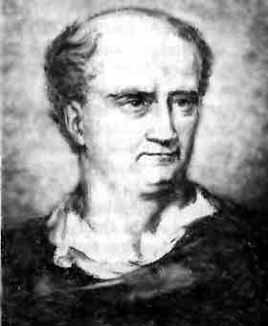Prominent Poles
Jozef Maria Hoene-Wronski, mathematician, philosopher

Born: August 23, 1778, Wolsztyn, Polish-Lithuanian Commonwealth
Died: August 8, 1853, Neuilly, France
Introduction.Hoene-Wronski was born Jozef Hoene but he adopted the name Wronski around 1810 just after he married. He had moved to France and became a French citizen in 1800 and then, in 1810 he moved to Paris.
In 1810 Wronski presented to the Institute of France a memoir on the so-called Technie de l'Algorithmie, The memoir consisted merely of a statement of results, and probably on this account, although favourably reported on by Lagrange and Lacroix, was not printed. Among other things he did was design caterpillar vehicles to compete with the railways. However they were never manufactured.
Applying philosophy to mathematics.His main work involved applying philosophy to mathematics, the philosophy taking precedence over rigorous mathematical proofs. He criticized Lagrange's use of infinite series and introduced his own ideas for series expansions of a function. The coefficients in this series are determinants now known as widely used Wronskians (so named by Muir in 1882).
In 1812 he published a work claiming to show that every equation had an algebraic solution, contradicting Ruffini 's results which were already published.
Wronski spent the years 1819 to 1822 in London. He came to England to try to obtain an award from the Board of Longitude but his instruments were detained by the Customs as he entered the country. He found himself in severe financial difficulties but, after his instruments had been returned to him, he was able to address the Board of Longitude. His address On the Longitude only contained generalities and did not impress.
A book published.His book Introduction to a course in mathematics was published in London in 1821.
In the first half of the century long-suffering Poland witnessed the emergence of a current of religious thought in which the national ideal was wedded to a humanitarian Messianism announcing universal peace and the kingdom of the Spirit.
Introduces Messianism.It was Wronski who introduced the word Messianism, which he used in a letter written to Pope Leo XII in 1827 and in many of his books (Introduction to Messianism 1831 ; Messianic Metapolitics, 1839 ; Messianism or Absolute Reform of Human Knowledge, 1847).He expressed his ideas mathematically, believing that in this way he was confirming their scientific precision. Politically, Hoene-Wronski announced a federation of peoples, which was one of the basic ideas of Polish Messianism
Evaluation of his work.For many years Wronski's work was dismissed as rubbish. However a closer examination of the work in more recent times shows that, although some is wrong and he has an incredibly high opinion of himself and his ideas, there are also some mathematical insights of great depth and brilliance hidden within the papers.
This information on Hoene-Wronski was abbreviated and partially modified from the article by J J O'Connor and E F Robertson that appeared in
St.Andrews Univ.
GAP is Copyright (C) 1986--1997 by Lehrstuhl D fuer Mathematik,
RWTH Aachen, Aachen. Germany and Copyright (C) 1997-2001 by School of Mathematical and Computational Sciences, University of St. Andrews, St. Andrews, UK
GAP can be copied and distributed freely for any non-commercial
purpose.
and from an article in
Korzybski
Return to home page:
Prominent Poles
